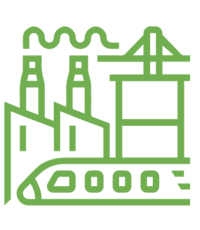
TF7 – Infrastructure Investment and Financing
A NEW VISION FOR INFRATECH: GOVERNANCE AND VALUE NETWORK INTEGRATION THROUGH FEDERATED DATA SPACES AND ADVANCED INFRASTRUCTURE SERVICES FOR A RESILIENT AND SUSTAINABLE FUTURE
ABSTRACT
Twenty-first century infrastructure needs to respond to changing demographics, becoming climate neutral, resilient and economically affordable, while remaining a driver for development and shared prosperity. However, the infrastructure sector remains one of the least innovative and digitalised, plagued by delays, cost overruns and benefit shortfalls (Cantarelli et al. 2008; Flyvbjerg, 2007; Flyvbjerg et al., 2003; Flyvbjerg et al., 2004). The root cause is the prevailing fragmentation of the infrastructure sector (Fellows and Liu, 2012). To help overcome these challenges, integration of the value chain is needed. This could be achieved through a use-case-based creation of federated ecosystems connecting open and trusted data spaces and advanced services applied to infrastructure projects. Such digital platforms enable full-lifecycle participation and responsible governance guided by a shared infrastructure vision. Digital federation enables secure and sovereign data exchange and thus collaboration across the silos within the infrastructure sector and between industries as well as within and between countries. Such an approach to infrastructure technology policy would not rely on technological solutionism but proposes the development of open and trusted data alliances. Federated data spaces provide access to the emerging data economy, especially for SMEs, and can foster the innovation of new digital services. Such responsible digital governance can help make the infrastructure sector more resilient, efficient and aligned with the realisation of ambitious decarbonisation and environmental protection targets. The European Union and the United States have already developed architectures for sovereign and secure data exchange.1
AUTHORS
Michael Bühler
Konstanz University of Applied Sciences (Lead author)
Thorsten Jelinek
Taihe Institute (Core team)
Konrad Nübel
Technical University Munich (Core team)
Norman Anderson
CG/LA Infrastructure
Glenn Ballard
UC Berkeley
Mark Bew
PCSG Limited
David Bowcott
Aon Risk Solutions
Kai Broek
Capgemini Invent
Gerd Buziek
Esri Deutschland GmbH
Isabel Cane
OECD
Raffaele Della Croce
OECD
Harry Dimitriou
University College London
Dale Evans
Project13
Jeff Herriman
Ascentage Group, LLC
Volker Kefer
Verein Deutscher Ingenieure
Isidora Kosta
World Economic Forum
Thomas Maier
G20 Global Infrastructure Hub
Ibrahim Odeh
Columbia University
Rafael Sacks
Technion Israel Institute of Technology
Thomas Schmid
Bavarian Construction Industry Association
Hajnalka Vaagen
Norwegian University of Technology